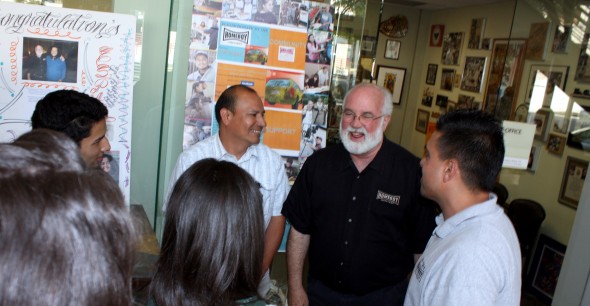Homeboy Industries Field Trip Inspires Anacapa
Experiential education is one of the many ways Anacapa School educates bright, young minds. Our all-school field trip to Homeboy Industries in Los Angeles is a perfect example of how we expand our more traditional, classroom learning.
How the Homeboy Industries Trip Came to Be
One of our Anacapa families tipped us off that Father Greg Boyle of Homeboy Industries was going to speak at Westmont College on April 11, 2011. “Father G” is a Jesuit priest who has become a legend for his work in turning gang members into non-violent, drug-free, productive citizens.
We made special arrangements with Westmont to attend Father G’s very moving presentation, after which we also enjoyed a tour of Westmont and were offered a complimentary lunch in their dining hall.
On the way back to school, the Anacapa faculty hatched the idea to travel to Los Angeles to see first-hand how Homeboy Industries works. Anacapa’s headmaster, Gordon Sichi, contacted Homeboy Industries right away and worked with them to set up our visit on Thursday, May 19.
Seeing Homeboy Industries in Action
Homeboy Industries assists at-risk, formerly gang-involved youth and the recently incarcerated to become contributing members of the community through a variety of services. Free programs include counseling, education, tattoo removal, and job training / placement. Homeboy services also include education, Twelve Step meetings, solar panel installation training, legal services, and mental health services. To help fund their services, Homeboy has a number of businesses, including the Homeboy Bakery, where rival gang members work together making bread! Other businesses include the Homegirl Café, which made our tasty box lunches, and Homeboy Silkscreen.
Experiencing the Positive Energy
Everyone at Homeboy was so friendly and positive with each other. The kindness and ever-present hugs were inspiring. Father G was busy at work, meeting and greeting a continual flow of people requesting services and work. His energy was apparent everywhere. His new book, Tattoos on the Heart, is becoming wildly popular, and we now have a signed copy for our school library.
For our tour, students and teachers were divided into three groups with Homeboy guides, who led us through the very busy building. After the tours, students picked up their box lunches and walked to a nearby park to hear testimonials from each of the three guides; they told us about their lives before and after Homeboy, and their stories were extraordinarily compelling.
On the way back to Santa Barbara, we stopped in Simi Valley to tour the Ronald Reagan Library, which has recently reopened with many new interactive exhibits.
Sharing Our Impressions
During Breakfast Club the morning after our field trip, students had a chance to discuss the impact the field trip made on them. Some students also wrote down their thoughts. Here is a sample of their perceptive reactions:
“Homeboy Industries is changing lives of this generation and the next generation because they are taking a generation that has already made mistakes and turning them into role models for the next generation. The man who gave us a testimonial has a six-year-old son who will never go into gang violence because he can learn from his father, who is turning his life around.”
– Wishiah Roper, 12th grade
“I found Homeboy Industries to be an amazing experience. People in gangs have the opportunity to change their personal paths in life, which betters the lives of future generations. Instead of looking at gangs as ‘blood in, blood out’, they are acknowledged as family at Homeboy, and will do more positive things than negative things with their lives.”
– Hannah Erickson, 11th grade
“I thought it was awesome that Homeboy Industries has free services for not just the gang members, specifically the tattoo removal and the free lawyer. Those services can really change a person’s life and help them better themselves.”
– Michelle Macias, 12th grade
“I didn’t realize how strong the ties of a gang are. In the absence of real family, people have this need to be supported, so they build a family for themselves that may be stronger than a biological one.”
– Aubrey Cazabat, 12th grade
“I was surprised to see how people at Homeboy Industries were neither thugs, nor completely scrubbed of their personalities. They were happy and optimistic to be working there.”
– Ila Rutten, 11th grade
“While I am impressed by everything Homeboy Industries does, I found it very upsetting that involvement at Homeboy brings more prejudice upon these people who are trying so hard to change. People tend to assume that everyone at Homeboy is in a gang, so when they are in public wearing their shirts, people hassle them. Our tour guide explained how, while on the train ride home, he has to turn his shirt inside out, or people will come up to him and demand, ‘Where’s your ticket? Are you on parole?’ Even if he shows his ticket, these people are unimpressed due to their assumptions alone. Even the police tend to look down upon Homeboy Industries, due to the assumption that these people are somehow permanently morally flawed.”
– Alyssa Gregory, 12th grade
For more photos from our trip, please see our Facebook Album.

